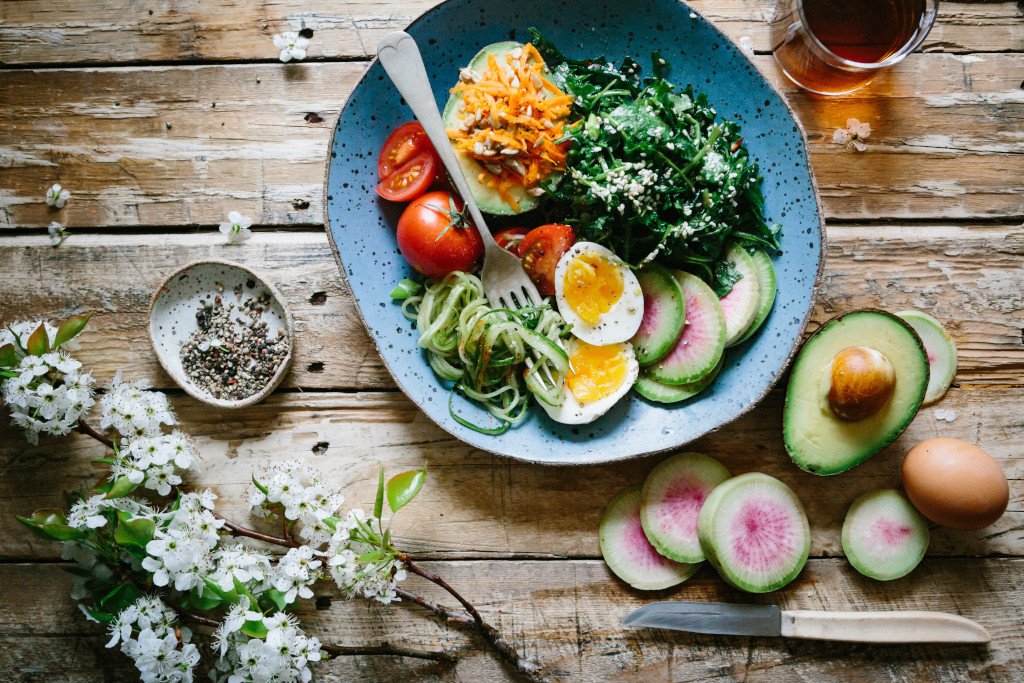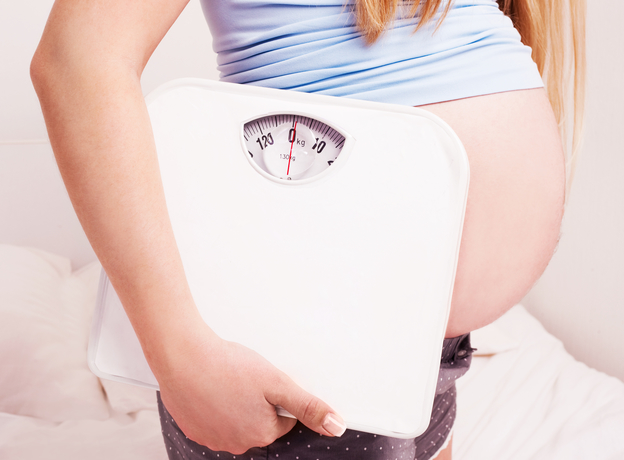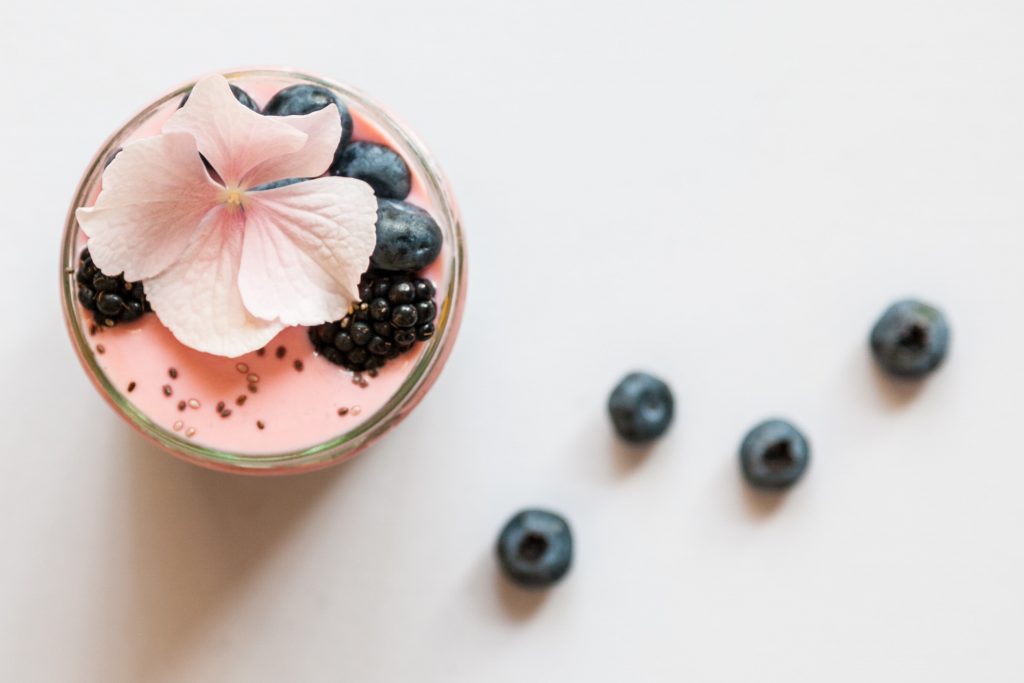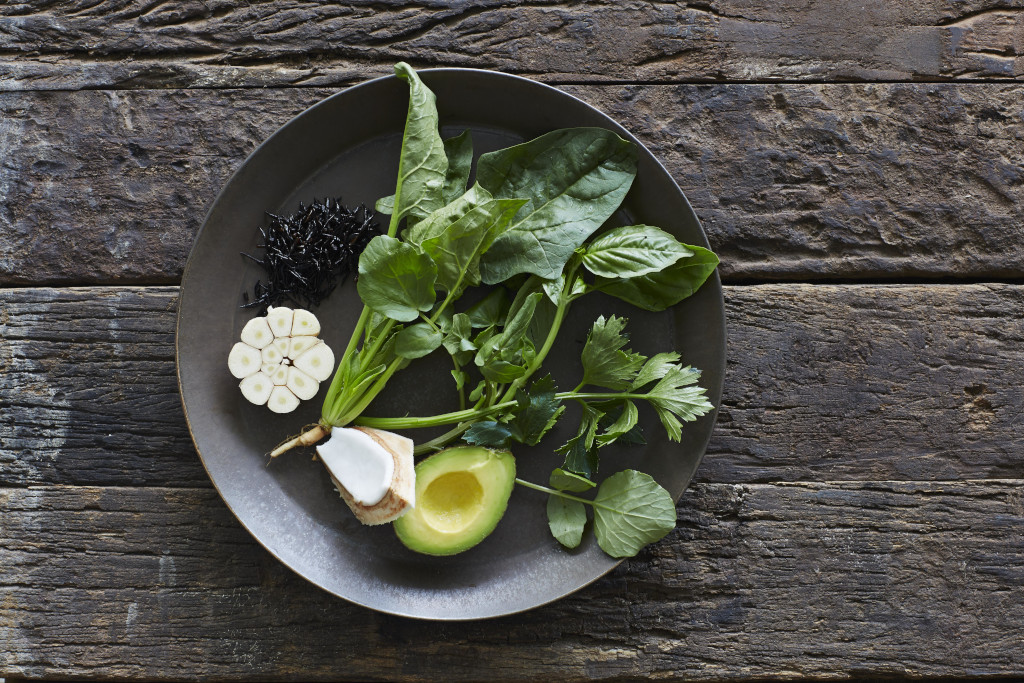Did you know that prenatal nutrition matters even before you get pregnant? According to registered nutritionist and dietician, Eve Persak, what you eat — or not — can affect both successful conception as well as your baby-to-be’s health and development. She also shares important prenatal nutrition tips and touch points as your pregnancy progresses. And read on for your bonus recipe!
Prenatal Nutrition Tips when Trying to Conceive

1. Cut down Caffeine and Alcohol
These two aren’t recommended during pregnancy, so it can be helpful to start weaning down as you work towards conception. It will not only relax your body (as both stimulate stress-related systems), but make the move to a caffeine-free and alcohol-free lifestyle far easier when the time arrives.
2. Avoid Processed Foods
Create a healthy ‘nest’ for an embryo by cutting out the unhealthy stuff. Processed foods tend to contain refined grains and added sugars, and are higher in saturated and trans fats. They also contain artificial chemical additives that aren’t good for our bodies.
- Refined grains (e.g. white rice, white flour products such as bread, noodles, pasta, cereal, pastries) and added sugars (e.g. sweeteners, candies, biscuits, desserts) promote inflammation and blood sugar instability. They also cause between-meal cravings, and offer little nutritional value besides calories and carbs.
- Foods high in saturated and trans fats (e.g. deep fried foods) are linked with inflammation and other health issues.
- Processed foods often contain artificial chemical additives (e.g. preservatives, stabilisers, colourings, flavourings, flavour enhancers, etc.), many of which are linked with health concerns.
(See also: Gestational Diabetes 101 – Are You at Risk?)

3. Focus on Whole Foods
Whole foods refer to those minimally touched by man or machine. They are easily recognised, digested, absorbed, and put to use by the body, and less likely to interfere or disrupt your body’s natural functioning.
- Instead of refined grains, focus on fibre-rich foods (e.g. whole grains, 100 per cent whole grain alternative products, vegetables, fruits, nuts, seeds), since fibre intake may support fertility. They also keep you fuller for longer, and maintain your blood sugar on an even keel.
- Look for cardiovascular-friendly monounsaturated fats (e.g. olives, olive oil, avocado) and anti-inflammatory Omega 3 fatty acids (eg. cold-water fish, flax, chia, walnuts, almonds). Omega 3 fatty acids may help balance key ovulation-inducing hormones and promote circulation to reproductive organs.
- Consider choosing organic and hormone-free varieties of your preferred foods. This frees your body of chemical residues from pesticides, as well as exogenous hormones (those from outside your body) that are often introduced to dairy, egg, and meat-based foods, which may interfere with your own hormonal cycles.
4. Optimise Key Nutrient Levels
Simply minimising processed foods and increasing whole food choices can work wonders for your overall micronutrient (vitamins and minerals) status, since nature-made foods offer these in abundance. However, mummy-hopefuls may consider adding a reputable multivitamin or single-nutrient supplements to help meet levels of key nutrients.
- Folic acid – This nutrient is essential to ensure proper brain and spinal cord development in the earliest stages of pregnancy. Hence optimal levels at the moment of conception is critical. Many physicians suggest supplementation prior to conception. Food sources that offer added support include leafy greens, beans and nuts, fortified whole grain cereals, oranges, and strawberries.
- Iron – Women with adequate iron levels tend to have less trouble conceiving than those with low iron stores. Ask your doctor to check on your levels and boost intake of iron-rich foods (e.g. lean, organic grass-fed meats, beans, dark green leaves, and broccoli).
(See also: 3 Stages in Every Woman’s Life that Call for an Extra Boost)
Prenatal Nutrition Tips for First Trimester

5. Prioritise Quality and Safety
During the first trimester, there is no need for extra calories. Rather, all daily intake decision-making should focus on food quality rather than quantity. Just as with the conception phase, the emphasis should be on abstaining from edibles that:
- may not be helpful when expecting (e.g. caffeine)
- offer little nutritional value (e.g. processed/fast foods, refined grains, added sugars)
- are not advisable/safe for the developing foetus (e.g. alcohol, deli meats, raw fish, under-cooked eggs, honey)
6. Fish for Brain-building Foods
Brain and nervous system development happens throughout the pregnancy (and after birth), but the first trimester is usually the period that stands out as most important. Ensuring the nutrients for these processes are readily available and in generous supply is essential. Some of these include:
- Omega 3 fatty acids (DHA and EPA) – These essential, polyunsaturated fatty acids are found in the highest concentrations in cold-water fish (e.g. salmon, mackerel, tuna, sardines, etc.). Plant-based sources (e.g. flax and chia seeds) offer ALA, which the body can convert to EPA and DHA, albeit only in small amounts. Consider a supplement (derived from fish or marine algae) if fish consumption isn’t adequate.
- Choline – This compound is also valuable for the growth, maintenance, and ongoing function of the nervous system. Food sources include chicken breast, salmon (and other cold-water fish), lean pork, egg yolks, beef, shrimp, low-fat dairy, soybeans, chickpeas, broccoli, and green peas.
- Folate – Sufficient levels of this B vitamin are imperative for preventing neural tube defects and ensuring proper early brain and spinal cord development.
- Vitamin B12 – Also helpful for brain development, this B vitamin is found in all animal-based foods. However, those on plant-based regimes may need to include nutritional yeast in their recipes, and consider further supplementation.
(See also: 5 Fabulous Fermented Foods for a Healthy Gut and Better Immunity)
Prenatal Nutrition Tips for Second and Third Trimester

7. Pile on (Positive) Extra Calories
Building anything requires energy. In the last two trimesters of pregnancy, Baby grows and gains weight rapidly. Likewise, Mum gains weight as breasts become larger in anticipation of breastfeeding. Therefore, calorie needs increase. It varies from woman to woman, but you’ll need approximately 340 and 450 more calories per day (than when non-pregnant) in the second and third trimesters respectively.
8. Spread out Your Meals
Small frequent meals tend to be an easier and more comfortable way to increase intake. The growing baby bump reduces available space in the abdomen, and larger meals require more digestive effort all at once. Spreading out food intake throughout the day also more evenly distributes the ‘work’ for the GI tract.
(See also: Fruit and Pregnancy: Which are Best for You and your Baby?)
9. Remember to Hydrate!
During the third trimester especially, your blood volume increases as Baby grows and requires more nutrients. As such, your fluid needs increase. Sip on clear, unsweetened, caffeine-free beverages throughout the day to help meet this need. Including liquid-y foods like smoothies and soups is a useful trick for promoting nutrition and hydration simultaneously.

10. Bulk up on Bone-building Foods
This is the time when Baby’s skeletal structure and bone begin to form, so nutrients involved in building bone are particularly important. These include:
- Calcium – This mineral is abundant in dairy products (e.g. milk, cheese, yogurt). But what about lactose-intolerant or vegan mums? Capitalise on calcium-rich plant-based foods (e.g. green vegetables, tofu, fortified alternative milks from nuts, soy or grains). A supplement can help ensure calcium needs for Mum and Baby are met.
- Vitamin D – This vitamin is available from sunlight. However, many women avoid sun exposure for skin health reasons, or spend daylight hours in the office. Food sources (e.g. cold-water fish, fortified dairy or non-dairy alternative milks) and a supplement can help.
- Protein – Most of bone — and all supportive connective tissues — is made of protein. So while the micronutrients above are important, protein is the key macronutrient for this task. High quality sources include lean meats, seafood, eggs, dairy, legumes, nuts, and seeds (especially chia).
11. Pump those Blood-building Nutrients
In the third trimester especially, your nutritional reserves are invested in building blood to account for increased maternal blood volume, increased placental blood flow, and building up iron stores for Baby. To support these needs, key nutrients include:
- Iron – The main mineral needed — not only to support the increased blood volume, but also to shore up iron reserves for the foetus. These iron stores will support Baby for the first few months of life.
- Vitamin C – This vitamin helps in absorbing iron available in plant-based foods — especially essential for expectant mums who avoid meats and prefer to rely on plant-based iron sources. Vitamin C is available in citrus, sweet peppers, leafy greens, berries, papaya, etc.
- B vitamins (folate and B12) – These two B vitamins, important for brain development, are also used in blood cell formation and integrity. When levels run low, anaemias can arise. So maintaining adequate intake throughout pregnancy is key.
- Protein – Protein is needed to build all blood cells. As this ‘volume’ of blood grows, ensure that it is loaded with all the blood-based constituents necessary to prevent anaemia and properly support the foetus.
(See also: 4 Easy Recipes to Boost your Immune System)
Bonus Recipe: Chilled Green Goddess Soup

This recipe is really easy to prepare — just fresh ingredients and a blender — which is helpful for mothers-to-be juggling all the prenatal prep. Yet it provides a useful nutrition-plus-hydration combo that’s easy to digest. It’s also a good source of calcium, iron, minerals, vitamin C, and fibre.
It’s a chilled soup, perfect for our warmer climate. This recipe works well as a standalone midday snack, but also pairs well with your choice of proteins. Consider a fillet of cold-water fish or a fresh salad with whole grains or legumes, perhaps? Happy cooking — and stay well!
Ingredients (4 servings):
- 1 small onion, sliced
- 2 cloves garlic
- 60 g English spinach
- 260 g watercress
- 55 g basil leaves
- 40 g flat-leaf parsley leaves
- 250 ml young coconut water
- Sea salt and ground white pepper, to taste
- 3 tsp coconut nectar or agave syrup
- 50 ml lemon juice
To serve:
- 125 ml (half cup) Avocado Crush (Mash 1 ripe avocado with the juice of a lemon quarter, a pinch of sea salt and black pepper, and a dash of Tabasco Sauce, till almost smooth. Refrigerate till needed.)
- 20 g soaked hijiki seaweed or sea spaghetti
- 9 g watercress leaves
Method:
- Place onion, garlic, veggies, herbs, and coconut water in a blender and blend till smooth.
- Season with sea salt and a grind of white pepper, then add coconut nectar/agave syrup, and lemon juice.
- Blend to combine. (If preparing ahead of time, store in fridge without adding lemon juice until ready to serve.)
- To serve, pour into chilled bowls.
- Top with a heaping spoonful of Avocado Crush, and scatter seaweed and watercress leaves. Enjoy!
As COMO Shambhala’s nutrition advisor, registered nutritionist and dietician Eve Persak specialises in providing guests with nutritional assessments and therapeutic interventions. The above recipe is courtesy of COMO Shambhala. Get more insight on your nutrition and overall well-being with the new digital wellness companion, COMO Shambhala By My Side.
The post 11 Prenatal Nutrition Tips for Mums-to-be (+ Bonus Recipe!) appeared first on TinySG.
from TinySG https://tinysg.com/11-prenatal-nutrition-tips-for-mums-to-be-bonus-recipe/?utm_source=rss&utm_medium=rss&utm_campaign=11-prenatal-nutrition-tips-for-mums-to-be-bonus-recipe

No comments:
Post a Comment